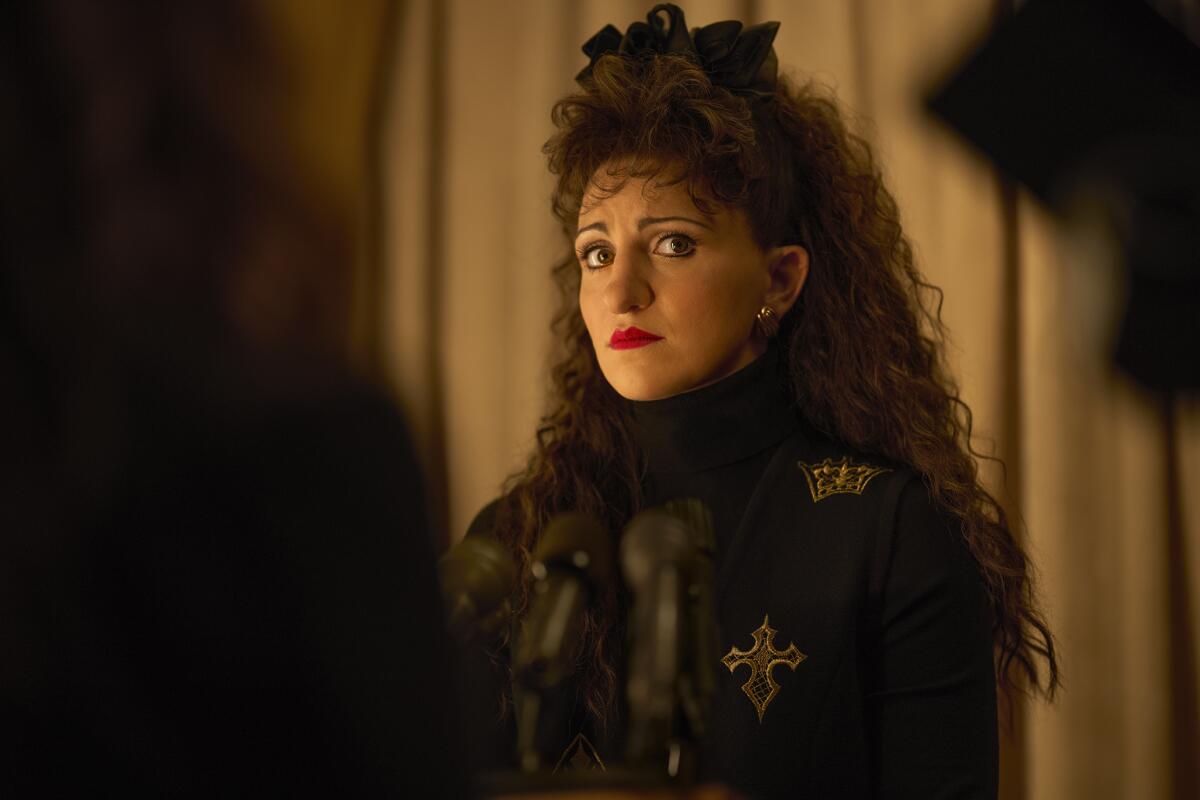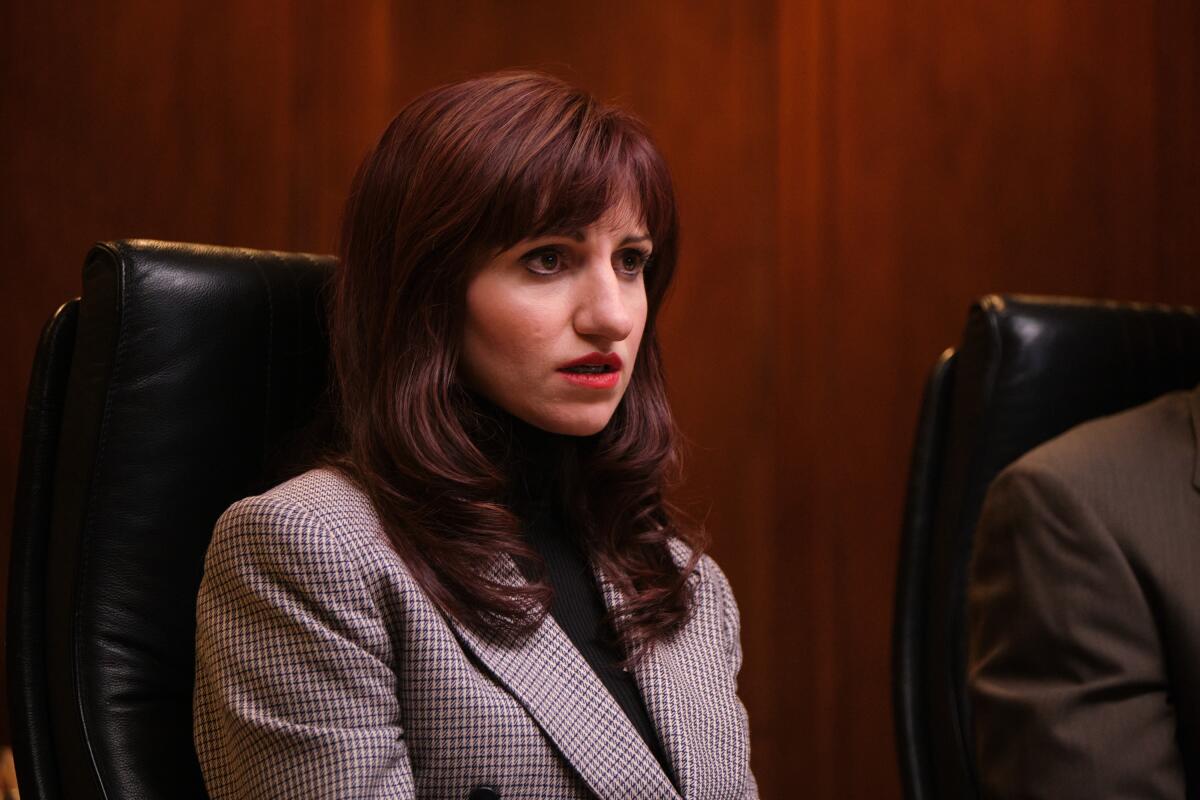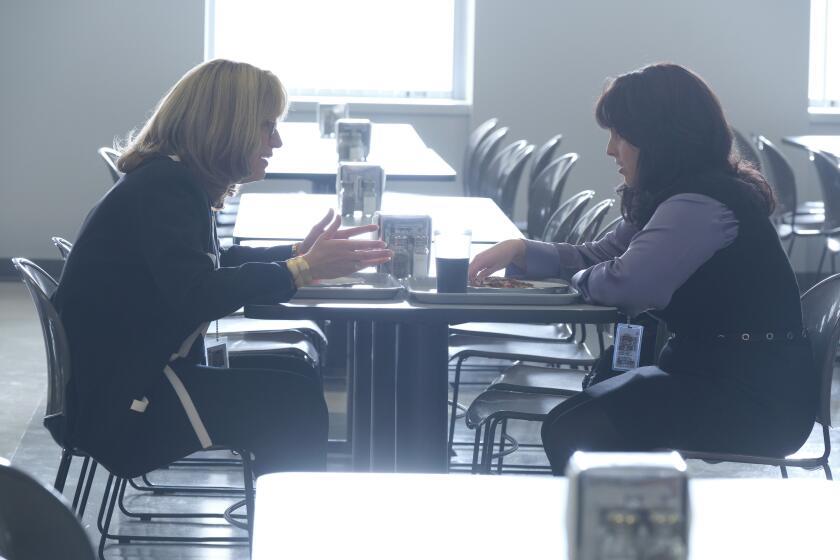Paula Jones slammed ‘American Crime Story.’ The woman who plays her understands why

- Share via
Annaleigh Ashford has never met Paula Jones, the woman who accused President Bill Clinton of sexual harassment in 1994, setting off a chain of events that would lead to the exposure of his affair with Monica Lewinsky, a landmark Supreme Court ruling and a historic impeachment.
But as she prepared to play Jones in “Impeachment: American Crime Story,” Ashford returned over and over again to a clip from “Inside Edition.”
The complete guide to home viewing
Get Screen Gab for everything about the TV shows and streaming movies everyone’s talking about.
You may occasionally receive promotional content from the Los Angeles Times.
In a 1998 interview for the tabloid newsmagazine, host Deborah Norville asks Jones, “With all due respect, why would Bill Clinton care about you?”
The question triggers an emotional reaction from Jones, whose dramatic makeover was making headlines at the time: “That was so rude,” Jones replies, raising her hands in a defensive motion. “That is exactly what I put up with every day: Why should he care? Why? I’m not worth anything?”

The exchange “told me more about her than any sit-down meeting I could have ever had,” says Ashford, 36, via video chat. “I can’t imagine what it would have felt like to have been thrust into the public eye in a way that she was not prepared for and to be made fun of so ruthlessly about her looks, the way she talked and her education. It must have been unbearable.”
From executive producer Ryan Murphy, “Impeachment” revisits one of the most exhaustively chronicled sagas in American political history from the perspective of the women whose lives — and reputations — were forever changed by the scandal.
The FX series provides Jones, once a late-night punching bag, with a long-overdue reconsideration. Ashford portrays her as an unsophisticated but justifiably aggrieved young woman treated cynically by both sides in a ruthless partisan battle. Her performance is inflected with humor as well as compassion, making us laugh at the absurdity of Jones’ circumstances without making her the butt of the joke.
This season dramatizes the road to the 1998 impeachment of President Bill Clinton. Here’s our guide to the women at the center of the story.
“She was in over her head and pushed into a world she didn’t understand,” says Ashford. “There’s a real childlike quality to Paula. And that was always something that was easy for me to access because I am a people-pleaser in life. I was raised to make people happy and say yes.”
Ashford is sitting on the floor of her dressing room at “B Positive,” the CBS sitcom in which she plays another well-meaning woman who finds herself out of her depth, in this case for laughs: Her character, Gina, donates a kidney to a high-school acquaintance and has to get sober to do so. Though Ashford’s a bit groggy, having just flown back to L.A. after an appearance at the Tony Awards a few nights earlier, her comedic instincts are on display as she provides a virtual tour of her glamorous surroundings.
“I’m hiding in the corner of my bathroom next to a trash can,” she says, affecting the tone of a self-important thespian — one of many voices she slides into almost subconsciously throughout our conversation. It’s the quietest place on set, she explains, even though she often hears loud jazz played by her next-door neighbor, “the legend, Hector Elizondo,” through a shared vent.
Though “Impeachment” and “B Positive” are strikingly different in tone and format, both projects play to Ashford’s ability to be funny and vulnerable in the same breath.

“In our greatest dramas, there’s always a beat of relief, and that’s what makes them great. You always laugh harder because you need to let out the pressure,” she says. “Then when you’re playing comedy, if it’s not grounded — if it’s not organic at its base — then it’s not gonna be funny.”
Raised in the suburbs of Denver, Ashford gravitated to age-inappropriate pop culture early on, watching “Cheers” and doing impressions of Linda Richman, the Mike Myers character from “Saturday Night Live,” that were often met with blank stares from her peers. “I didn’t understand why my friends didn’t think I was funny,” she says.
She found a kindred spirit when she enrolled in a local dance school run by a woman named Kitt Andrée, “who wasn’t French but wanted to be,” she says, and introduced her to the magic of Bob Fosse. Ashford remembers renting a copy of “All That Jazz” from Blockbuster so many times the tape wore out.
Continuing her precocious streak, Ashford graduated high school early, moved to New York and made her Broadway debut at 21 in “Legally Blonde: The Musical.” In 2013, she earned her first Tony nomination as a plucky factory worker in “Kinky Boots,” opposite Billy Porter, and played an amusingly candid sex worker in Showtime’s period drama “Masters of Sex.”
There’s a throwback, screwball quality to many of Ashford’s signature performances, including her Tony-winning role in a 2014 revival of the Depression-era favorite “You Can’t Take It With You.” (It makes perfect sense she’s attached to play Judy Holliday in a biopic about the Oscar-winning “Born Yesterday” star.)
“I vividly remember sitting in the audience when I first saw ‘Kinky Boots’ and just being astounded at her abilities and her comic chops,” says Chuck Lorre, executive producer of “B Positive.” “This tiny, blond-haired girl takes over an entire theater when she’s on stage, seemingly effortlessly, and I remember thinking, ‘Someday, I would love to work with her.’”
After reclaiming Marcia Clark, the actor expected her latest role to change minds about ‘the most hated woman in America.’ She may have miscalculated.
“B Positive” leans heavily on Ashford’s deft skills as a physical comedian — in the pilot she drunkenly falls out a window — and her knack for playing lovable eccentrics. Because of the pandemic, the multi-camera sitcom has had to tape without the customary live audience and, Ashford says, “It feels like we’re missing an old friend.”
Ahead of Season 2, which premieres this month, the show has been revamped to focus on her character, who uses an unexpected financial windfall to help the residents of the senior living center where she works.
“On any TV series, you’re hoping to find actors that can can grow with the part and the part can evolve to encompass all their abilities,” says Lorre, who compares Ashford to Christine Baranski, another theater veteran fluent in both Sondheim lyrics and sitcoms rhythms.
Jake Gyllenhaal appeared with Ashford in an acclaimed 2017 revival of “Sunday in the Park With George,” not long after she’d given birth to her son, now 5. The actor was struck by how she approached the material “body first, as a dancer.”
“It was like she was coming from a whole different land I had not yet explored,” he says. “There was a lot of talk about the pelvic floor post-pregnancy. I had the privilege of being in very intimate, small spaces, pre- post- and during the show, so I learned a lot about that and just how she connects to the ground.”
Ashford’s performance as Jones was similarly rooted in physical details. She wore a prosthetic nose, braces and an array of wigs, spending about three hours in the makeup chair each morning before she’d uttered a single line of dialogue. The production tracked down and purchased the exact ensemble Jones wore to the Conservative Political Action Conference in 1994.
“It was so important to the narrative because her physical appearance was pushed and changed by the people around her,” says Ashford, who worked with dialect coach Amy Jo Jackson to master Jones’ girlish timbre and Arkansas drawl.
Ashford is “the only person I imagined in the role and the only person who could play it,” showrunner Sarah Burgess says in an email. “I felt I could go as far as I wanted in the writing and she would carry it forward with humanity.”
Jones, a former Arkansas state employee, claimed that Clinton, while governor, had summoned her to a Little Rock hotel room in 1991, exposed his penis to her and pressured her for oral sex. The small-town girl from Arkansas suddenly found herself on the cover of Newsweek.
At its heart, “Impeachment: American Crime Story” is a story of human foibles. But you may need a timeline to keep straight key developments in the saga.
Like Monica Lewinsky, Linda Tripp and other women enmeshed in the scandal, Jones became an object of misogynistic ridicule. On “The Tonight Show” she was caricatured mercilessly as a big-haired, trailer park floozy with a Muppet-like fake nose. Even Jones’ lawyers treated her with open disdain. “Paula can’t even spell politics,” one of them told the New York Times.
“Paula’s lack of control over her case — and the political and personal motivations of those around her — allowed many to dismiss her claim unfairly,” Burgess says. “I wanted to plainly depict the ways in which Paula never had a chance to be taken seriously, to challenge our audience to have the same reaction to her and interrogate that reaction in an era when we constantly reassure ourselves we have changed.”
Ashford, who was an adolescent at the time of the impeachment, says the project forced her to consider the role she played as an eager observer of the media circus. “I knew this story through the lens of late-night comedy because I watched Jay Leno and Conan O’Brien. And I laughed a lot at these women because I was told that that’s what you were supposed to do.”

Because many of the real-life situations portrayed in “Impeachment” border on farce, Burgess needed someone who could find the emotional truth beneath the tabloid spectacle.
“The tone of the show is so absurd and the kaleidoscope of characters around Paula so bizarre at times that I feel I handed Annaleigh scripts that risk feeling like a Jenna Maroney vehicle,” says Burgess, referring to the narcissistic actress played by Jane Krakowski in “30 Rock.” “She plays the comedy in Paula’s scenes without losing the almost unbearable vulnerability of Paula moment-to-moment.”
When Ashford, in character as Jones, explains that Clinton’s penis “takes a turn,” it’s impossible not to laugh. But when Clinton’s lawyers aggressively interrogate her about her sexual history, you feel humiliated on her behalf. During that scene, “everything inside of me as a woman cringed, was uncomfortable, felt small,” Ashford says.
Jones recently spoke out against “Impeachment,” calling it inaccurate and cartoonish, and slammed its creators for not consulting her.
Ashford is not surprised by Jones’ negative reaction to the series. “It probably feels so uncomfortable to have your story told while you’re still around to tell it yourself,” she says, “but I hope that she can see how much love we really gave to her.”
More to Read
The complete guide to home viewing
Get Screen Gab for everything about the TV shows and streaming movies everyone’s talking about.
You may occasionally receive promotional content from the Los Angeles Times.









